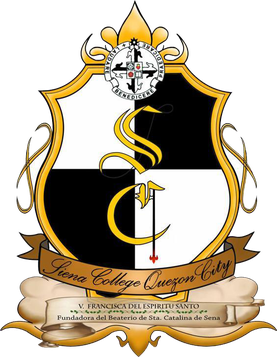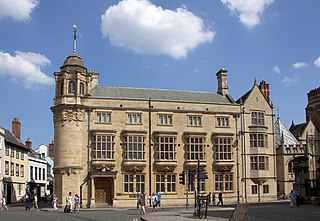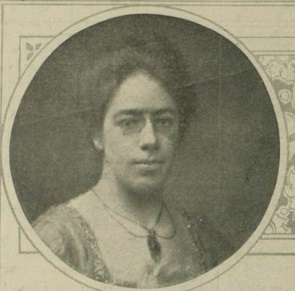Presbyterianpolity is a method of church governance typified by the rule of assemblies of presbyters, or elders. Each local church is governed by a body of elected elders usually called the session or consistory, though other terms, such as church board, may apply. Groups of local churches are governed by a higher assembly of elders known as the presbytery or classis; presbyteries can be grouped into a synod, and presbyteries and synods nationwide often join together in a general assembly. Responsibility for conduct of church services is reserved to an ordained minister or pastor known as a teaching elder, or a minister of the word and sacrament.

The University of Western Ontario (UWO), also known as Western University or Western, is a public research university in London, Ontario, Canada. The main campus is located on 455 hectares of land, surrounded by residential neighbourhoods and the Thames River bisecting the campus's eastern portion. The university operates twelve academic faculties and schools. It is a member of the U15, a group of research-intensive universities in Canada.

The Oxford University Student Union is the official students' union of the University of Oxford. It is better known in Oxford under the branding Oxford SU or by its previous name of OUSU. It exists to represent Oxford University students in the university's decision-making, to act as the voice for students in the national higher education policy debate, and to provide direct services to the student body. The president for the 2022–23 academic year is Michael-Akolade Ayodeji. Akolade-Ayodeji will be succeeded by Danial Hussain.
A students' union, also known by many other names, is a student organization present in many colleges, universities, and high schools. In higher education, the students' union is often accorded its own building on the campus, dedicated to social, organizational activities, representation, and academic support of the membership.
Proctor is a person who takes charge of, or acts for, another.

The Students' Society of McGill University (SSMU) is the accredited representative of the undergraduate student body at the downtown campus of McGill University.

The Pontifical Catholic University of Valparaiso (PUCV), also known as Universidad Católica de Valparaíso (UCV), is one of six Catholic universities in Chile and one of the two pontifical universities in the country, along with the Pontifical Catholic University of Chile. Founded in 1928, it is located in Valparaíso Region and has about 17,000 students.
Dean is a title employed in academic administrations such as colleges or universities for a person with significant authority over a specific academic unit, over a specific area of concern, or both. In the United States and Canada, deans are usually university professors who serve as the heads of a university's constituent colleges and schools. Deans are common in private preparatory schools, and occasionally found in middle schools and high schools as well.

Siena College of Quezon City is a private, sectarian, non-stock basic and higher education institution run by the Congregation of the Dominican Sisters of St. Catherine of Siena in San Francisco del Monte, Quezon City, Philippines. It was established in 1959 by the Siena Sisters. The school offers tertiary education with degrees in Tourism, Business Administration, Hotel and Restaurant Management, Mass Communications and Religious Education. It also offers pre-school, elementary, secondary education, and SPED.

The University of Abuja is a tertiary institution in the Nigerian capital, Abuja. It was established in January 1988 as a dual-mode university with the mandate to run conventional and distance learning programmes. Academic work began in the university in 1990 with the matriculation of its pioneer students.

The Michael Okpara University of Agriculture, originally the Federal University of Agriculture, is a federal university in Umudike, Abia State, Nigeria was established as a specialized University by a Federal Government of Nigeria Decree No 48 of November 1992. It began formal activities in May 1993 with the appointment of the first Council and Vice-Chancellor Professor Placid C. Njoku on 27 May 1993, while other key officials of the University were appointed later.

The Indian Institute was an institute within the University of Oxford. It was started by Sir Monier Monier-Williams in 1883 to provide training for the Indian Civil Service of the British Raj. The institute's building is located in central Oxford, England, at the north end of Catte Street, on the corner with Holywell Street, and facing down Broad Street from the east.
A university council may be the executive body of a university's governance system, an advisory body to the university president, or something in between in authority.

The history of the Roman Curia, the administrative apparatus responsible for managing the affairs of the Holy See and the Catholic Church, can be traced to the 11th century when informal methods of administration began to take on a more organized structure and eventual a bureaucratic form. The Curia has undergone a series of renewals and reforms, including a major overhaul following the loss of the Papal States, which fundamentally altered the range and nature of the Curia's responsibilities, removing many of an entirely secular nature.

The Faculty of Engineering, University of Peradeniya is one of the eight academic faculties at the university. It is the oldest engineering faculty in Sri Lanka. It offers full-time Undergraduate Courses leading to the degree of Bachelor of Science of Engineering (B.Sc.Eng.), and several postgraduate degrees.

The University of Cambridge is a public collegiate research university in Cambridge, England. Founded in 1209, the University of Cambridge is the third-oldest university in continuous operation.
The Faculty of Medieval and Modern Languages is a department of the University of Oxford, England. It is part of the university's Humanities Division.

John Bernard Bamborough was a British scholar of English literature and founding Principal of Linacre College, Oxford.

The Oxford University Act 1854, sometimes called the Oxford University Reform Act 1854 or the University Reform Act 1854, is an Act of the Parliament of the United Kingdom, which regulates corporate governance at the University of Oxford, England. It established the Hebdomadal Council, the leading body in the university's administration, stating that most members of full-time academic staff were to have voting rights over it. In the year 2000, the Hebdomadal Council was replaced by the University Council, which is responsible to the Congregation of staff members.

Lynda Grier, CBE was a British educational administrator, policy advisor, and the principal of Lady Margaret Hall, Oxford, from 1921 to 1945. Born in Staffordshire, Grier was profoundly deaf as a child, which resulted in her lack of formal education. When she and her mother, after her father's death, moved to Cambridge, Grier obtained permission to attend lectures at Newnham College as an external student. In order to enroll formally, she had to teach herself basic math and languages to fill the gaps in her prior reading education. Graduating in 1908, she became an assistant teacher at Newnham and in 1913 was promoted to assistant lecturer. In 1915, she transferred to the University of Leeds, where she taught economics until the war ended.













